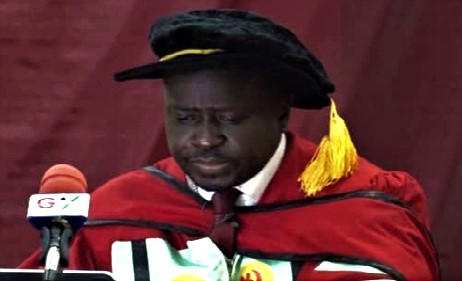The Government Statistician, Professor Samuel Kobina Annim, has said workers in the public sector are generally overpaid for work done.
The Government Statistician said averagely, public sector workers were paid double for their output.
He has, therefore, called for the creation of a Public Productivity Committee of Parliament to work like the Public Accounts Committee and ensure that ministries, departments and agencies (MDAs) and the public sector, in general, deliver output commensurate with their earnings.
Delivering his inaugural lecture at the University of Cape Coast last Thursday, Prof. Annim said while earnings averaged about GH¢3,420 for the public sector worker, output in the sector averaged about GH¢1,420, less than half the earnings.
"What people earn should be equal to their output and be equal to what they spend," he said, adding that basically there was something wrong and that such gaps should be closed in the country's quest for real development.
He observed that the tenure of public officers of such institutions and organisations should be renewed or revoked, based on the attainment of targets.
Prof. Annim said workers should be made to account for their output.
Inaugural lecture
Prof. Annim is a Professor of Economics at the University of Cape Coast and currently the Government Statistician on secondment.
He is dedicated to promoting knowledge transformation across the continent and beyond.
The lecture, his first as full professor, was on: “Data Policy Transitions: Perspectives of Economic Variables”.
It was chaired by the Vice-Chancellor of the university, Prof. Johnson Nyarko Boampong.
After the lecture, the college of professors welcomed the new professor into their fold, confirming his assumption of full professorship.
Data integrity
Prof. Annim stressed the importance for the country to build a data integrity framework (DIF) based on indicators such as appropriateness, reliability and credibility of using data, statistics and statistical data.
He observed that indicators and measurements were often adjusted, leading to conflicting data from international organisations and national data institutions, which sometimes negatively impacted policy decisions.
The development economist said depending on interest and convenience, politicians and organisations had adopted different indices and indicators to generate data.
He added that there still remained huge contradictions between world repositories of data and those of the Ghana Statistical Service (GSS), other agencies and civil society organisations in the nation, saying those groups used data that suited their propositions.
"Sometimes you see data in national policies that are not even consistent with the data that we hold from our MDAs," Prof. Annim added, saying it was time to clean up the data landscape and provide the needed bias corrections to rightfully impact policy.
Prof. Annim charged academia to work on developing data relevant to policy decisions and which impacted the development of the country positively.
He said the many high volatility in variables in relation to microeconomic indicators made it difficult for any meaningful predictions and planning.
Unemployment rate
The Government Statistician said, for instance, that there was no way the nation's unemployment rate was 13.4 per cent.
He said as a development economist, he was sometimes uncomfortable defining unemployment in a heavily informal economy by asking people whether they worked for one hour in the last seven days and whether they were available for work and whether they sought for work.
"We do this and we get 13.4 per cent and we want to celebrate. This is what I call the politicisation of statistics. Ghana's unemployment rate can simply not be 13.4 per cent, but for the sake of international benchmarks, the International Labour Organisation (ILO) put it there and we have been using it,” he said.
The economics professor said a lot of the statistics were not reflective of our economy.
He indicated that in experimental statistics, taking into consideration people who had contracts to work and unemployment, plus the vulnerability of employment, the unemployment rate would be something around 49 per cent.
"Unless we appreciate the reality of our economy, tackling our development will be far off,” he said, adding that “we should face the realities".
Prof. Annim also identified what he referred to as "unspoken economic indicators" in the country on productivity, earnings, inequality, trade vulnerability, capital flight and stocks of grains, in spite of data availability in those areas.
He called on academicians to venture into data gathering in such areas to impact policy.
Asset
Prof. Boampong described Prof. Annim as an asset in his area who continued to make a significant impact.
The vice-chancellor urged Prof. Annim to continue to mentor many more excellent economists.
Latest Stories
-
Women accused of booing Zimbabwe’s First Lady freed
43 seconds -
Ghana sets sights on hosting 2026 Senior African Athletics Championships – Bawa Fuseini
1 min -
Telecel Ghana Music Awards board makes changes to nominations after review
35 mins -
We need an independent body to investigate Tema Kplejoo shooting incident – Lanchene Toobu
37 mins -
Morocco and Belgium reaffirm commitment to Libya’s sovereignty, national unity
45 mins -
LPG consumption tumbles by 4.47% – IES
1 hour -
Dollar rises to five-month high, puts heat on yen
1 hour -
You can’t order arrest of drivers for increasing fares – Joyce Bawah to Transport Minister
1 hour -
GWCL to publish list of defaulters as it is overwhelmed by GH¢1.2bn indebtedness
1 hour -
Tanzania, Rwanda, Zimbabwe join African recall of J&J cough syrup
1 hour -
Moroccan Sahara: Belgium sees autonomy initiative as ‘Good Basis’ for solution
1 hour -
IMF doesn’t buy from our market; their positive assessment of Ghana’s economy needless – Adongo
2 hours -
“Give us back our money” – Aggrieved customers of Gold Coast Fund give gov’t 3-month ultimatum
2 hours -
Manhunt as ‘dangerous’ suspects escape Namibia cell
2 hours -
Luis Enrique confident of PSG comeback against Barcelona
2 hours

